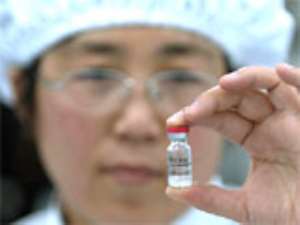
The government on Thursday awarded more than $1 billion to five drug manufacturers that are developing technology for speedier mass production of vaccines in case of a pandemic.
The money comes from the $3.8 billion that Congress approved last year. The goal is to be able to distribute vaccine to every American within six months of a pandemic striking.
Currently, flu vaccines are produced in specialized chicken eggs, but that technique does not allow for speedy mass vaccination.
"The hard truth is that, at this moment, the capacity simply does not exist in the United States to produce vaccines with sufficient speed and quantity to reach everyone out there.
That's true of countries all over the world, but that's about to change," said Mike Leavitt, secretary for the Department of Health and Human Services, before signing the contracts.
The companies are GlaxoSmithKline, $274.8 million; MedImmune Inc., $169.5 million; Novartis Vaccines and Diagnostics, $220.5 million; DynPort Vaccine Co., $41 million; and Solvay Pharmaceuticals Inc., $298.6 million.
The contracts cover a five-year period.
Leavitt said vaccines are America's best line of defense if there is a pandemic.
Such an outbreak can occur when people have little immunity to a particular strain of flu that spreads across the globe.
Leavitt often refers to the pandemic of 1918 as an example of a worst-case scenario that he says could kill up to 2 million Americans.
"There is no reason to believe the 21st century will be different than centuries past," Leavitt said.
Health officials are concerned that a form of influenza now spreading in birds could eventually mutate and spread from person to person.
Leavitt said the contracts would help the government meet other goals, including the diversification of a domestic supply of vaccines so that the United States would not have to rely on foreign production during a pandemic.
He also said the technology could help the country build up its stock of seasonal flu vaccines as well.
Leavitt noted that the government is also stockpiling masks, gloves and other equipment that could be used in a pandemic and it has contracted with drug manufacturers to provide for 4 million treatment courses of a vaccine against the current H5N1 virus.
He said that researchers are also working on the development of a new generation of vaccines that would be broadly protective of a wide range of influenza viruses.
"The challenges are substantial, but if we can get there, it would take the threat of a pandemic right off the table," Leavitt said.
David Stout, president of pharmaceutical operations at GlaxoSmithKline, said that vaccine manufacturers are about three to five years away from growing flu vaccines in large laboratory vats rather than in individual eggs.
The $274.5 million his company gets will primarily go to research and clinical trials.
"What this funding does is accelerate the speed in which we can do the work," Stout said.
Leavitt could not say how much of their own money the drug companies would be investing in cell-based technology, but he said the government's funding would leverage a significant investment.
"They're not just simply taking our money and doing research," he said.
"They are making substantial commitments of their own in terms of people, capital and resources."
The contract with DynPort Vaccine could lead to greater funding down the road based on the company's performance, HHS officials said.
The company, which is collaborating with Baxter Healthcare Corp., described the contract as valued at $242.5 million.




 Lay KPMG audit report on SML-GRA contract before Parliament – Isaac Adongo tells...
Lay KPMG audit report on SML-GRA contract before Parliament – Isaac Adongo tells...
 Supervisor remanded for stabbing businessman with broken bottle and screwdriver
Supervisor remanded for stabbing businessman with broken bottle and screwdriver
 NDC watching EC and NPP closely on Returning Officer recruitment — Omane Boamah
NDC watching EC and NPP closely on Returning Officer recruitment — Omane Boamah
 Your decision to contest for president again is pathetic – Annoh-Dompreh blasts ...
Your decision to contest for president again is pathetic – Annoh-Dompreh blasts ...
 Election 2024: Security agencies ready to keep peace and secure the country — IG...
Election 2024: Security agencies ready to keep peace and secure the country — IG...
 People no longer place value in public basic schools; new uniforms, painting wil...
People no longer place value in public basic schools; new uniforms, painting wil...
 'Comedian' Paul Adom Otchere needs help – Sulemana Braimah
'Comedian' Paul Adom Otchere needs help – Sulemana Braimah
 Ejisu by-election: Only 33% of voters can be swayed by inducement — Global InfoA...
Ejisu by-election: Only 33% of voters can be swayed by inducement — Global InfoA...
 Minority will expose the beneficial owners of SML, recover funds paid to company...
Minority will expose the beneficial owners of SML, recover funds paid to company...
 Prof. Opoku-Agyemang has ‘decapitated’ the NPP’s strategies; don’t take them ser...
Prof. Opoku-Agyemang has ‘decapitated’ the NPP’s strategies; don’t take them ser...
